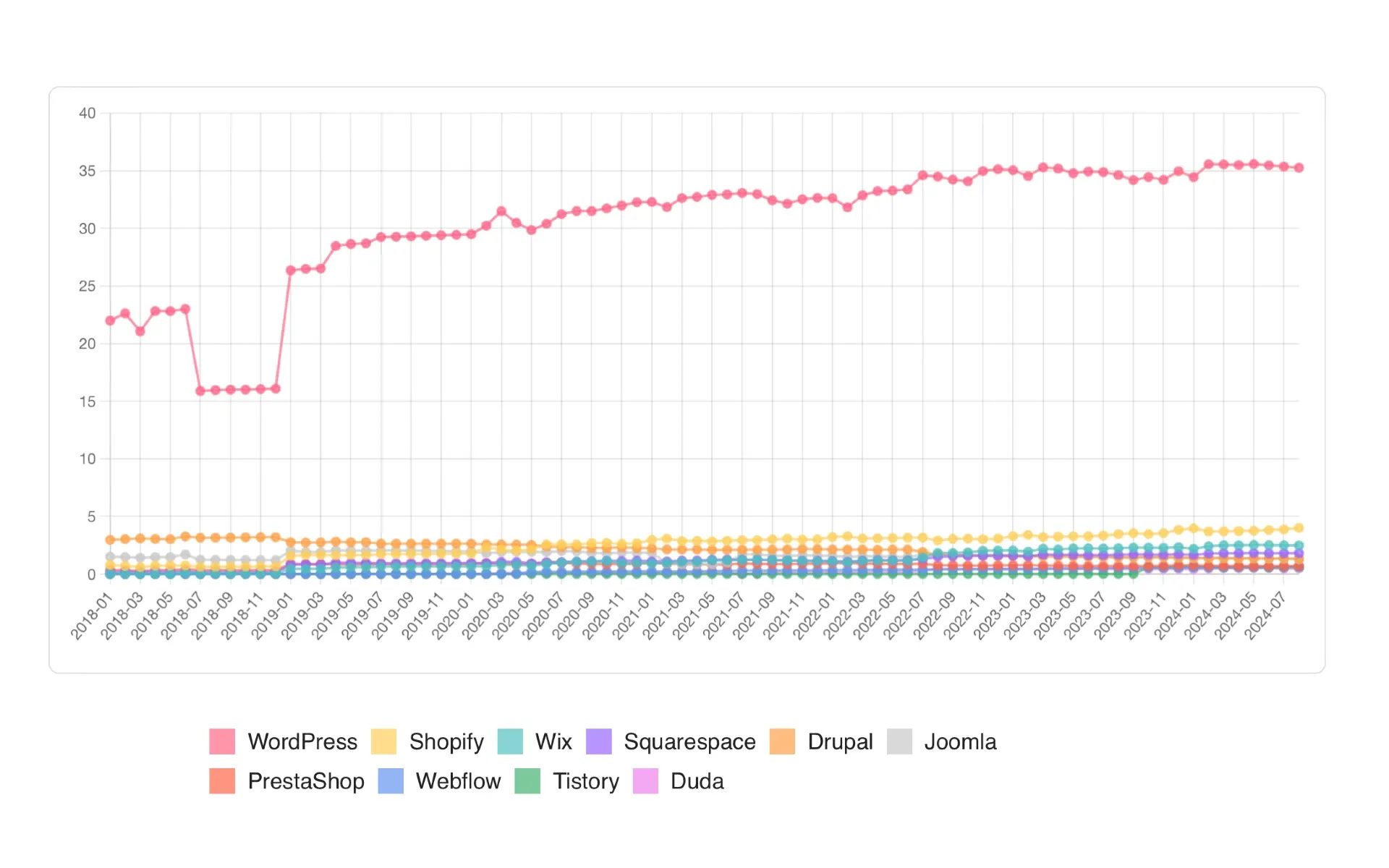WordPress market share stagnates
Industry leaders discuss marketing collaborations and user experience improvements to reinvigorate WordPress adoption.

On August 28, 2024, the WP Product Talk podcast hosted a discussion on WordPress market share trends and potential strategies for product businesses. The episode featured insights from prominent WordPress community members on current adoption rates and ways to reinvigorate growth.
According to Joost de Valk, founder of Yoast SEO, WordPress market share appears to be stagnating rather than declining outright. De Valk bases his analysis on HTTP Archive data, which samples approximately 13 million larger websites. This dataset shows WordPress powering around 35% of sampled sites, with minor fluctuations month-to-month.
Noel Tock, partner at Human Made, expressed more concern about future trends. Tock's research focuses on new WordPress installations within the top 1 million websites tracked by BuiltWith. He noted a shift towards WordPress being implemented on subdomains rather than primary domains for major brands, potentially indicating less strategic use.
Both analysts emphasized the importance of user excitement and product innovation in driving adoption. They pointed to a lack of recent "game-changing" features in WordPress core as one factor in the plateauing growth.
Miriam Schwab, Head of WordPress Relations at Elementor, highlighted the need for coordinated marketing efforts to showcase WordPress capabilities. She noted that individual product companies face limitations in promoting WordPress directly due to trademark restrictions.
Rich Tabor, Product Manager at Automattic, stressed the importance of creating an intuitive, inspiring user experience. He suggested that recent development efforts may have prioritized complex functionality over ease-of-use for common tasks.
Key challenges identified for WordPress growth include
- Lack of centralized marketing strategy and resources
- Declining excitement and "buzz" around new releases
- Strong competition from well-funded proprietary platforms
- Limitations on using "WordPress" in third-party marketing
- Potential perception of WordPress as an outdated platform
Proposed solutions discussed during the podcast included
- Formation of a marketing consortium among major WordPress companies
- Allowing premium plugin sales on WordPress.org to fund marketing efforts
- Improved coordination of high-quality video content creation
- Renewed focus on intuitive user experiences in core development
- Embracing and promoting innovative plugins to extend functionality
The panelists emphasized the critical role of the plugin ecosystem in WordPress' success. They suggested that both core WordPress and the broader plugin landscape may need to accelerate innovation to compete effectively.
Community engagement was also highlighted as an area of concern. Matt Mullenweg, co-founder of WordPress, recently shared data showing declining attendance at local WordPress meetups. This trend could impact grassroots adoption and enthusiasm for the platform.
The discussion touched on the challenges of coordinating marketing efforts within an open-source project. Previous attempts to establish dedicated marketing teams for WordPress have faced obstacles. Some participants suggested that external, industry-led initiatives may be necessary to drive significant change.
Joost de Valk proposed that WordPress product owners should actively explore and promote new plugins to showcase ongoing innovation in the ecosystem. Miriam Schwab advocated for companies to collaborate on marketing WordPress itself, not just individual products.
Rich Tabor emphasized the need to create "beautifully simple experiences" to inspire new and existing users alike. Noel Tock urged the WordPress community to "get out of the bubble" and compete more actively with alternative platforms.
The podcast highlighted the complex interplay between core WordPress development, the plugin ecosystem, and marketing efforts in shaping overall platform adoption. While not facing immediate decline, the discussion underscored a sense of urgency among industry leaders to revitalize growth strategies.
Key facts and figures mentioned
- WordPress powers approximately 35% of sampled sites in the HTTP Archive dataset
- The dataset includes around 13 million larger, more trafficked websites
- WordPress adoption on subdomains is increasing for major brands
- Local WordPress meetup attendance is declining, according to Matt Mullenweg
- Elementor and WooCommerce were cited as examples of products driving WordPress growth
- Google Trends data shows declining search interest for "WordPress" as a term

